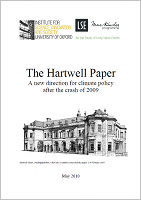 Calls for a radical re-framing of policies to deal with climate change are intuitively attractive — after all, current national and international policies don’t seem to be doing much to curb rising emissions. The latest effort comes from a group of developed world academics brought together by London School of Economics professor Gwyn Prins, and takes the form of The Hartwell Paper [PDF] — a document based on discussions held in February at the English country houseof the same name. It suggests ditching Kyoto and all its structures, and instead tackling climate change with policies that approach the problem more obliquely. The authors claim:
Calls for a radical re-framing of policies to deal with climate change are intuitively attractive — after all, current national and international policies don’t seem to be doing much to curb rising emissions. The latest effort comes from a group of developed world academics brought together by London School of Economics professor Gwyn Prins, and takes the form of The Hartwell Paper [PDF] — a document based on discussions held in February at the English country houseof the same name. It suggests ditching Kyoto and all its structures, and instead tackling climate change with policies that approach the problem more obliquely. The authors claim:
…it is not possible to have a ‘climate policy’ that has emissions reductions as the all encompassing goal. However, there are many other reasons why the decarbonisation of the global economy is highly desirable. Therefore, the Paper advocates a radical reframing – an inverting – of approach: accepting that decarbonisation will only be achieved successfully as a benefit contingent upon other goals which are politically attractive and relentlessly pragmatic.
Sounds reasonable enough at first reading, but my suspicions were roused when I read beyond the executive summary.
Prins et al derive the need for their new approach from what they describe as two watersheds that were crossed in late 2009: the failure of COP15 in Copenhagen to deliver on its promise of a global deal to follow Kyoto, and what they call “an accelerated erosion of public trust [in climate science] following the posting […] of more than a 1,000 emails from the University of East Anglia Climatic Research Unit” last November. Copenhagen clearly did not live up to expectations, and the UN-mediated policy process may well have lost impetus, but the authors go on to assert that the CRU email theft, and the subsequent press furore and investigations means that “the legitimacy of the institutions of climate policy and science are no longer assured”. That, it seems to me, is a very long bow to draw. To see the Hartwell take on the emails applauded by Steve McIntyre and that they approvingly reference Andrew (Bishop Hill) Montford’s book The Hockey Stick Illusion suggests to me that the authors are coming at the issue with their own set of preconceptions — a framing they want to impose on the issue. A look at the author list (Roger Pielke Jr, Nordhaus and Shellenburger from the US think tank The Breakthrough Institute, amongst others) hardly dispels that notion…
When they consider the underlying science, they are at pains to misrepresent what’s going on:
Climate change was brought to the attention of policy-makers by scientists. From the outset, these scientists also brought their preferred solutions to the table in US Congressional hearings and other policy forums, all bundled. The proposition that ‘science’ somehow dictated particular policy responses, encouraged – indeed instructed – those who found those particular strategies unattractive to argue about the science. So, a distinctive characteristic of the climate change debate has been of scientists claiming with the authority of their position that their results dictated particular policies; of policy makers claiming that their preferred choices were dictated by science, and both acting as if ‘science’ and ‘policy’ were simply and rigidly linked as if it were a matter of escaping from the path of an oncoming tornado.
If “the science” has been unhelpful, then this misrepresentation of the message is even more so. The basic message from “the science” is clear enough. There’s too much carbon in the atmosphere, and adding more is going to make life very uncomfortable — all life, not just human beings — in the not too far distant future. Did scientists really bundle this message with “particular policy responses”? Only if reducing carbon emissions can be considered a policy response — but that’s the very response Prins et al seems to want to dance around. Decarbonisation they can countenance, but not now, not quantified. They want to ignore the quantification of the size of the problem we face because it might be inconvenient:
We share the common view that it would be prudent to accelerate the historical trend of reducing the carbon intensity of our economies, which has been a by-product of innovation since the late eighteenth century. However, we do not recommend doing so by processes that injure economic growth, which we think – and the history of climate policy demonstrates – is politically impossible with informed democratic consent.
What if political impossibility is confronting the harsh impact of physical reality? The Hartwell Paper assumes that we have the luxury of time, that we can step away from the progress made over the last 20 years , and somehow recast international policy according to a wishlist of interventions that might (if we’re lucky) set us on the right path. They imply that we need not face reality now, that we should take the Capability Brown approach to a country house, up a winding path that yields carefully framed glimpses of our goal, rather than march straight towards a target defined by our understanding of physical reality.
There is some good analysis of The Hartwell Paper at the Economist (with nice Eno reference), and by Richard Black at the BBC. Both writers suggest that whatever the merit of the Paper’s recommendations, the authors cannot ignore where we are now. We may not want to start from where we are, but we have no choice. In a wider perspective, the Paper is arguing for a bottom up approach to carbon reductions, looking for the low hanging fruit — efficiencies, black carbon reduction — while the Kyoto approach is top-down, starting (with luck) from an informed appreciation of what we would do well to avoid. It seems obvious to me that we need both approaches, at a national as well as international level. Setting a 40% target for emissions reduction by 2020 is just as valid as mandating the use of low energy lightbulbs, or encouraging the adoption of electric vehicles.
Prins, Pielke Jr et al prefer to ignore what we really know about the climate system and the one-way nature of the changes we’re imposing on it (who can put a species back after it’s gone, or reconstruct a coal seam?), adopting instead a high-minded but ultimately wishy-washy stew of policies that look a lot more like sticking plasters than a remedy. And, being a cynic, I can’t resist asking the cui bono question… who might benefit most from the policy mix they propose? I leave the answer as an exercise for the reader.

 It was a happy experience to open the Waikato Times last week and see across from the editorial page the profile of scientist Jim Salinger under the headline Salinger doesn’t feel critics’ heat. The
It was a happy experience to open the Waikato Times last week and see across from the editorial page the profile of scientist Jim Salinger under the headline Salinger doesn’t feel critics’ heat. The  Greenpeace has been digging. It has unearthed Koch Industries as a major funder of climate change denial groups. A new 44 page
Greenpeace has been digging. It has unearthed Koch Industries as a major funder of climate change denial groups. A new 44 page